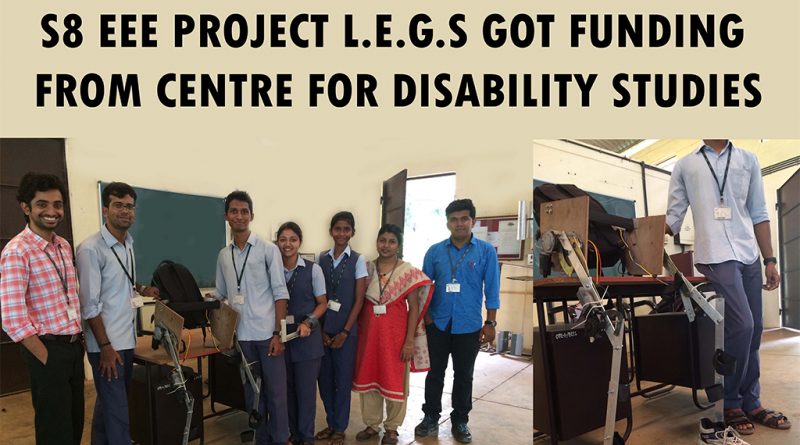EEE student project gets funding from Centre for Disability Studies
A S8 B Tech (EEE) student project titled “Lower Exoskeleton Guided System” has been granted an amount of Rs.30,000 by Centre for Disability Studies, a Government of Kerala Undertaking. The project aims to develop an ergonomic, cost effective, yet powerful exoskeleton to aid the disabled persons. The of students who worked on the project consisted of Anjali Pradeep, Mithun Gireesan, Saranya K S and Vivek Sha V. The Principal Investigator of the project is Ms. Anooja V S (AP, EEE Dept) and the Co-investigators are Dr Nimal Madhu M (Asso. Prof., EEE Dept) and Mr Arun Xavier (AP< EEE Dept).
About the Project
Robotic lower limb exoskeletons have been built for augmenting human performance, assisting people with disabilities, studying human physiology, and re-training motor deficiencies. The main function of a powered exoskeleton is to assist the wearer by boosting their strength and endurance. This project aims to develop an ergonomic, cost effective, yet powerful exoskeleton to aid the disabled. This system uses a light weight, but stiff material capable enough to handle the compressive stresses developed by the weight of the user. The links are driven using independent motors. Electric motors are used for the actuators due to their higher efficiency and lower weight. The system is fastened to the wearers legs using broad Velcro strips to employ universal compatibility and to avoid discomfort. The current system uses a pre-programmed microcontroller to actuate the motors. The speed and number of revolutions are determined in accordance with the human gait cycle. The pace can be altered by suitably changing the voltage supplied to the motors using the driver circuit. The primary benefactors of the product will be the senior citizen, whose numbers are expected to shoot up to 70 percentages by 2050. The L.E.G.S can be used by people with disabilities below waist and can be used as an alternative to wheelchairs.

